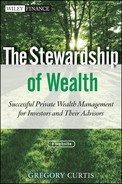Notes
1 Duration is a more accurate measure of the interest rate sensitivity of a bond portfolio than the more commonly used “maturity,” because duration includes all cash flows coming in from the bond, including interest payments and principal repayments. Thus, a bond with a ten-year maturity and a 5 percent yield will have a much shorter duration (and hence will be much less susceptible to interest rate changes) than a bond with a ten year maturity and a 3 percent yield.
2 Eric Jacobson, “Still a Leader Worth Following,” Morningstar Fund Analysis, (February 10, 2012) available at http://analysis.morningstar.com/analystreport/far.aspx?t=PTTDX®ion=USA.
3 Commissions on the purchase of U.S. Treasury securities are very small, and can be avoided altogether by using the Treasury Direct program. Because we are planning to hold all our bonds until they mature, there will be no commissions on sales.
4 Deflation is not to be confused with disinflation, a propitious condition in which the rate of inflation is declining.
5 The Obama administration has proposed to tax municipal bond interest.
6 As this chapter was being written, both Harrisburg, Pennsylvania and Jefferson County, Alabama (Birmingham) had declared bankruptcy.
7 The guidelines will also give tax information about the investor. While most municipal bond investors will be in the highest federal and state tax brackets, family investors increasingly fall under the provisions of the Alternative Minimum Tax. AMT taxpayers will sometimes find that tax-exempt bonds will be appropriate and that sometimes taxable bonds will be appropriate. Our municipal bond manager must therefore possess capabilities in both taxable and municipal securities.
8 In other words, buying and selling bonds through dealers on our behalf, not selling bonds to us as a broker would do.
9 Okay, okay, some companies that technically fall into the junk bond category, especially the upper echelons of junk (BB rated bonds, let's say) are hardly “junk companies.” Some simply happen to be in an industry that is temporarily out of favor, while others are going through a rough period financially but are fundamentally sound. Most issues of junk bonds, however, are highly speculative investments.
10 In the fall of 2002, spreads between Treasuries and junk bonds reached their widest gaps in history. This was, to say the least, a propitious time to buy junk bonds.
11 This phrase refers to the phenomenon just noted: A money market fund that purchased many of its investments when rates were higher will still own those investments until they gradually mature. Thus, the interest rate offered by the fund will be higher than the interest rate investors could get by buying similar investments today. The fund's yield will gradually decline, of course.
